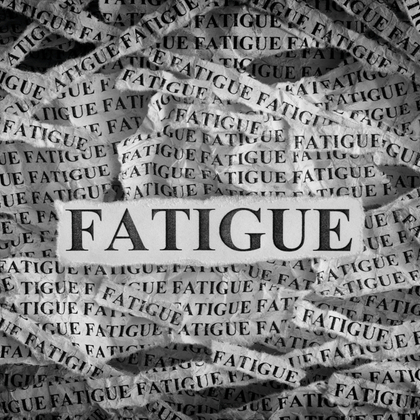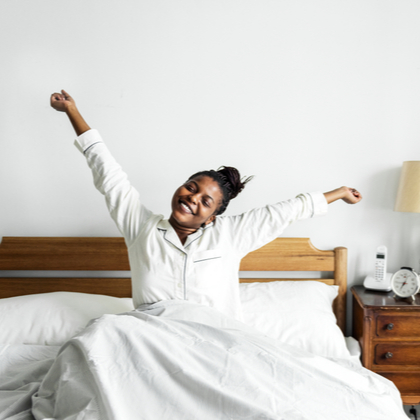
Sleep experts usually recommend seven to nine hours of sleep to feel adequately refreshed and restored. Without this amount, lethargy and exhaustion will start to impact your daily life. However, it’s also possible to sleep too much — that is, sleeping for more than nine hours regularly.
Like sleeping too little, oversleeping (also known as hypersomnia) can disrupt the body’s natural circadian rhythm, leading to potential health risks. That’s no need to worry, however, as there are many ways to break this cycle of oversleeping. In this guide, we’ll uncover some of the causes of oversleeping to help you determine the root of the problem.
How much sleep do you need?
As mentioned, most adults need between seven to nine hours’ sleep every night to support their health and wellbeing. That being said, ‘restful night’s sleep’ isn’t just determined by quantity — it’s about quality, too. If you’re not getting quality sleep, you might be overcompensating by oversleeping. Discover some ways to improve your sleep quality in our helpful guide.

Signs that you’re oversleeping
There’s a difference between oversleeping and catching a few extra hours here and there. If you think you’re consistently sleeping too much, watch out for the following symptoms: i
- You wake up feeling tired and fuzzy
-
You feel lethargic and sluggish all-day
-
You suffer from headaches
-
Your memory is hazy
-
You feel low and ‘blue’
Be mindful that each of these areas can be improved by making the necessary changes to your sleep hygiene.
Causes of oversleeping: Why am I sleeping so much?
Oversleeping is not always caused by events that occur at night. Sometimes it can be a response to infection and illness, although, more often than not, it’s triggered by daily stressors and lifestyle factors. Below we’ll break down some key causes of oversleeping.
Depression and anxiety
Often, changes in sleep are the first indicator of a dip in your mental health. Low mood and anxiety can lead to a lack of motivation, which can make it harder to get out of bed in the morning.ii For some people, sleep becomes a form of escapism.
Dealing with anxiety, low mood, and poor sleep can be difficult at times, especially since sleep and mood disturbances can trigger a vicious cycle.iii While mental health conditions can trigger sleeping problems in their own right, oversleeping can also further compromise emotional wellbeing.
Seasonal Affective Disorder (SAD)
Often referred to as ‘SAD’, seasonal affective disorder typically occurs in the winter months when there is a reduction in natural sunlight. Less sunlight can lead to a reduction in serotonin production — our body’s mood booster— which is naturally triggered by light, making some of us feel lower and sadder during winter. Social withdrawal, fatigue, and depression, and oversleeping are therefore knock-on effects of this.iv Research suggests that bright light therapy can support the body’s circadian rhythm in dark, winter months, making up for the lack of natural light.v
Alcohol
Certain substances, especially alcohol, can make you feel drowsy, lethargic, and more inclined to oversleep.vi Consistently consuming alcohol, especially before bed, can disrupt REM sleep — the deepest stage of sleep where dreams happen, memories are consolidated, and learning occurs.vii By disrupting your sleep-wake cycle, it leads to fragmented and poor quality sleep. As a result, you often need to sleep more to feel rested. Discover more on how alcohol affects the quality of your sleep in our guide. It might be worth talking to your doctor about switching medication if you’ve been given a prescription drug with a sedative effect.viii
Hypothyroidism
Hypothyroidism, otherwise known as an underactive thyroid, is a deficiency in thyroid hormones. Your thyroid hormones are involved in the function of nearly every organ in the body; they help determine heart rate and regulate metabolism. As such, when these essential hormones are low, you can feel fatigued, lethargic, and sluggish. For many people with this condition, a healthy seven to nine hours’ sleep isn’t adequate to shake the tiredness or exhaustion. As a result, oversleeping is often a comorbidity of hypothyroidism.9
If you consistently sleep more than nine hours and feel excessively tired throughout the day, it’s important to take steps to improve your sleep quality. For even more advice on how to drift off to sleep soundly, feel free to browse our sleep hub.
References:
-
NHS. (2019). Excessive daytime sleepiness (hypersomnia). Available online: https://www.nhs.uk/conditions/excessive-daytime-sleepiness-hypersomnia
-
NHS. (2019). Clinical depression - Symptoms. Available online: https://www.nhs.uk/conditions/clinical-depression/symptoms
-
Psychology Today. (2019). The Surprising Risks of Sleeping Too Much. Available online: https://www.psychologytoday.com/gb/blog/sleep-newzzz/201901/the-surprising-risks-sleeping-too-much
-
NHS. (2019). Seasonal affective disorder (SAD). Available online: https://www.nhs.uk/conditions/seasonal-affective-disorder-sad
-
Virk. G., Reeves. G., Rosenthal. N.E., Sher. L. & Postolache. T.T. (2009). Short exposure to light treatment improves depression scores in patients with seasonal affective disorder: A brief report. International journal on disability and human development : IJDHD. 8(3), 283–286.
-
Sleepfoundation.org. (2019). How Medications May Be Negatively Affecting Your Ability to Sleep. Available online: https://www.sleepfoundation.org/articles/how-medications-may-affect-sleep
-
Stein. M.D. & Friedmann. P.D. (2005). Disturbed sleep and its relationship to alcohol use. Substance abuse. 26(1), 1–13.
-
Rupp. T., Acebo. C. & Carskadon. M. (2007). Evening Alcohol Suppresses Salivary Melatonin in Young Adults. Chronobiology International. 24(3), 463-470.
-
Sleepfoundation.org. (2019). Could a Thyroid Condition Be the Reason You Have a Sleep Disorder? - National Sleep Foundation. Available online: https://www.sleepfoundation.org/articles/your-thyroid-blame-your-sleep-issuesp

Olivia
Olivia Salter has always been an avid health nut. After graduating from the University of Bristol, she began working for a nutritional consultancy where she discovered her passion for all things wellness-related. There, she executed much of the company’s content marketing strategy and found her niche in health writing, publishing articles in Women’s Health, Mind Body Green, Thrive and Psychologies.
View More



